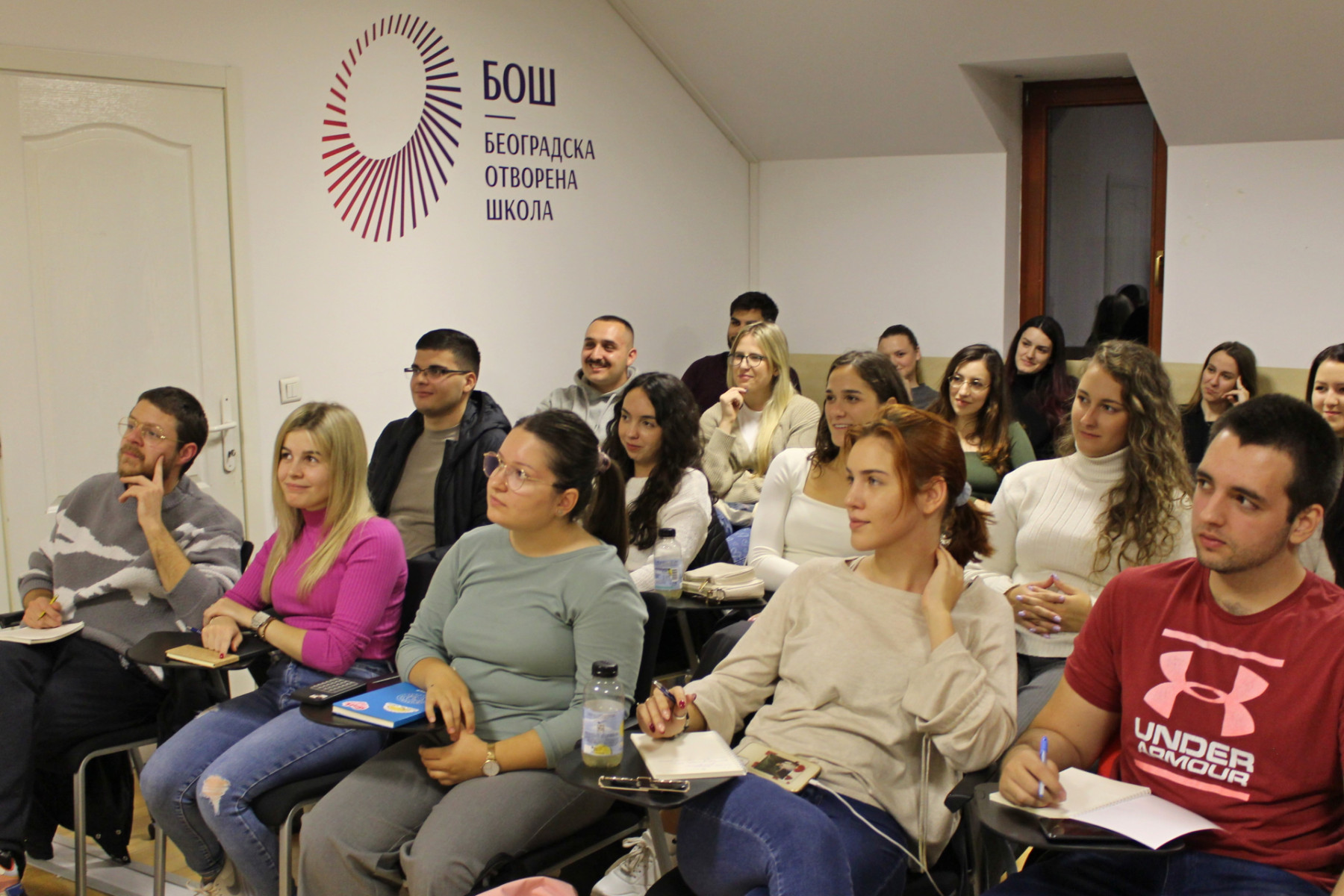Activities during the Fall Semester, Year 2024/25

Students of the 32nd generation had the opportunity to attend lectures and participate in workshops during the fall semester, which lasted from October to the end of December 2024, within the modules Knowledge for the Future and Skills for the Future.
The Knowledge for the Future module covered a wide range of topics—from climate and the environment, through psychology and economics, to international politics. After the introductory lecture on the future of education and the problems of the education system, delivered by Srđan Verbić, an assistant professor at FEFA and former Minister of Education, a lecture was held by Tamara Džamonja Ignjatović, full professor at the Department of Psychology at the Faculty of Philosophy, University of Belgrade. She spoke about societal problems and their effects on individuals.
Just before the presidential elections in the United States, assistant professors at the Faculty of Political Sciences, Stevan Nedeljković and Milan Krstić, gave a lecture titled Kamala Harris or Donald Trump: The Significance of the 2024 U.S. Elections for the Future of International Relations. The lecturers focused on the potential impact of the election results on the global political scene and discussed how U.S. foreign policy toward key regions may change depending on the election winner.
Vuk Jeremić, former President of the UN General Assembly, President of the Center for International Cooperation and Sustainable Development, and lecturer at the Paris School of International Affairs (Sciences Po), spoke about the future of the world order and global crises. Special emphasis was placed on geopolitical recession and the changes that a second Trump presidency could bring.
Dejan Šoškić, full professor at the Faculty of Economics and former Governor of the National Bank of Serbia, spoke about the fundamental principles of banking and finance. He discussed how financial markets and lending work, as well as the future of blockchain technology and cryptocurrencies.
Radmilo Pešić, retired professor from the Faculty of Agriculture at the University of Belgrade, gave a lecture on agricultural resources and food in the 21st century. He highlighted current global agricultural resource challenges and the factors affecting food availability and hunger in various regions of the world.
Aleksandra Krstić, associate professor at the Faculty of Political Sciences, presented part of her research on the importance of political cartoons for democracy. Participants had the chance to view numerous cartoons from U.S. history. She emphasized how cartoons have always represented freedom of expression. The second part of the lecture featured American cartoons produced during the wars in the former Yugoslavia.
Climate change and its impact were also addressed. Nemanja Milović, founder of the website Klima101, spoke about the consequences of climate change, various strategies to combat it, and what actions are needed to mitigate its expected impact.
The final lecture in the Knowledge for the Future module was delivered by Vladimir Jelenković, former director of the Nikola Tesla Museum. Through a lecture on Nikola Tesla’s vision of the future, students learned about his life, legacy, and numerous inventions that shaped the future of humanity.
The Skills for the Future module was delivered through workshops, focusing on practical advice to help students acquire essential modern-day skills. Special attention was given to public speaking and presentation skills.
Rhetoric workshops were led by Vladimir Pavićević, academic advisor for the Future Studies program, while public speaking and presentation skills workshops were prepared by communication trainer Relja Dereta. The advice shared proved valuable for both everyday and professional communication.
Dragana Ignjić, RTS journalist and author of the TV magazine Oko, led a workshop on the significance of television and gave practical advice on how to present oneself effectively on camera.
Vladimir Nićiforović, actor, photographer, and designer, shared his career journey with students, demonstrating that one’s profession can change after formal education, and that dedication is the key to success.
A workshop on the importance of debate, argumentation, counter-arguments, and logical fallacies was organized by Andrijana Ristić, member of Open Communication and former president of the Debate Club at the Faculty of Political Sciences. Students were introduced to the basics of debating, including how to construct arguments, analyze and refute opposing arguments, and recognize logical fallacies. They practiced their skills through exercises that developed their argumentation and critical thinking.
Students also explored the skill of dance through a Tango workshop, in collaboration with trainer Darko Dožić. The workshop combined communication skills with dance, offering a unique experience for participants.
In addition to knowledge and skills, the Psychological Support module, led by psychologist Jana Stojanović, addressed topics such as anxiety, conflict, self-criticism and self-perception, assertive communication, and emotional attachment.

 381 63 687 763
381 63 687 763







